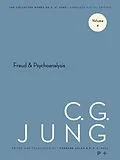The authoritative edition of Jung's essential writings for understanding his early enthusiasm for-and later split with-Freud and psychoanalysis Freud and Psychoanalysis gathers Jung's writings on Freud and psychoanalysis published between 1906 and 1916, along with two later, related papers. The book covers the period of the enthusiastic collaboration between the two pioneers of psychology through the years when Jung's growing appreciation of religious experience, his criticism of Freud's emphasis on pathology, and other differences led to Jung's formal break with his mentor. Part I features brief studies of Freud's theory of hysteria, dream analysis, the psychology of rumor, and other subjects. Parts II and III contain the essentials of the criticism that led to Jung's rupture with Freud, the most important of which is "The Theory of Psychoanalysis." Part IV presents "The Significance of the Father in the Destiny of the Individual." The book's final two pieces, "Freud and Jung: Contrasts" and the introduction to a book by W. M. Kranefeldt, further illuminate Jung's reassessment of psychoanalysis.
Autorentext
C. G. Jung Translated by R.F.C. Hull
Inhalt
- FrontMatter,
- Editorial Note,
- Table Of Contents,
- Freud's Theory of Hysteria: A Reply to Aschaffenburg,
- The Freudian Theory of Hysteria,
- The Analysis of Dreams,
- A Contribution to the Psychology of Rumour,
- On the Significance of Number Dreams,
- Morton Prince, "The Mechanism and Interpretation of Dreams": A Critical Review,
- On the Criticism of Psychoanalysis,
- Concerning Psychoanalysis,
- The Theory of Psychoanalysis,
- General Aspects of Psychoanalysis,
- Psychoanalysis and Neurosis,
- Some Crucial Points in Psychoanalysis,
- Prefaces to Collected Papers on Analytical Psychology,
- The Significance of the Father in the Destiny of the Individual,
- Introduction to Kranefeldt's "Secret Ways of the Mind",
- Freud and Jung: Contrasts,
- Bibliography,
- Index,
